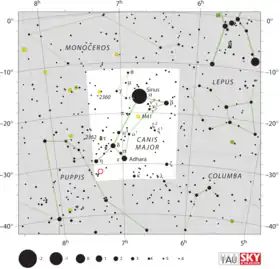 | |
| Observation data Epoch 1996.7 Equinox J2000.0 | |
|---|---|
| Constellation | Canis Major |
| Right ascension | 07h 20m 24.961s |
| Declination | −31° 25′ 50.21″ |
| Apparent magnitude (V) | ~26.6[1] |
| Details | |
| Radius | ~5 km |
| Other designations | |
RX J0720.4−3125, 1ES 0718−31.3 | |
| Database references | |
| SIMBAD | data |
RX J0720.4−3125 is a neutron star in the constellation Canis Major. It was discovered in 1997 in the ROSAT All-sky survey.[1] Measurement of its parallax leads to an estimate of around 360 parsecs (1,200 light-years) for its distance from Earth.[2] It is a member of the Magnificent Seven, a group of neutron stars that are relatively near to the Solar System. RX J0720.4–3125 has a radius of around 5 km. Its spectrum and temperature appear to be mysteriously changing over several years. The nature of the changes are unclear, but it is possible there was an event such as the star's absorption of an accretion disc.[3]
References
- 1 2 Kaplan, D.L.; van Kerkwijk, M.H.; Marshall, H.L.; Jacoby, B.A.; Kulkarni, S. R.; Frail, D.A. (2003). "The Nearby Neutron Star RX J0720.4-3125 from Radio to X-rays". The Astrophysical Journal. 590 (2): 1008–1019. arXiv:astro-ph/0303126. Bibcode:2003ApJ...590.1008K. doi:10.1086/375052. S2CID 17115753.
- ↑ Kaplan, D. L.; van Kerkwijk, M. H.; Anderson, J. (2007). "The Distance to the Isolated Neutron Star RX J0720.4-3125". The Astrophysical Journal. 660 (2): 1428–43. arXiv:astro-ph/0703343. Bibcode:2007ApJ...660.1428K. doi:10.1086/513309. S2CID 18223428.
- ↑ Hohle, M.M.; Haberl, F.; Vink, J.; de Vries, C.P.; et al. (2012). "The Continued Spectral and Temporal Evolution of RX J0720.4-3125". Monthly Notices of the Royal Astronomical Society. 423 (2): 1194–99. arXiv:1203.3708. Bibcode:2012MNRAS.423.1194H. doi:10.1111/j.1365-2966.2012.20946.x. S2CID 55696761.
This article is issued from Wikipedia. The text is licensed under Creative Commons - Attribution - Sharealike. Additional terms may apply for the media files.